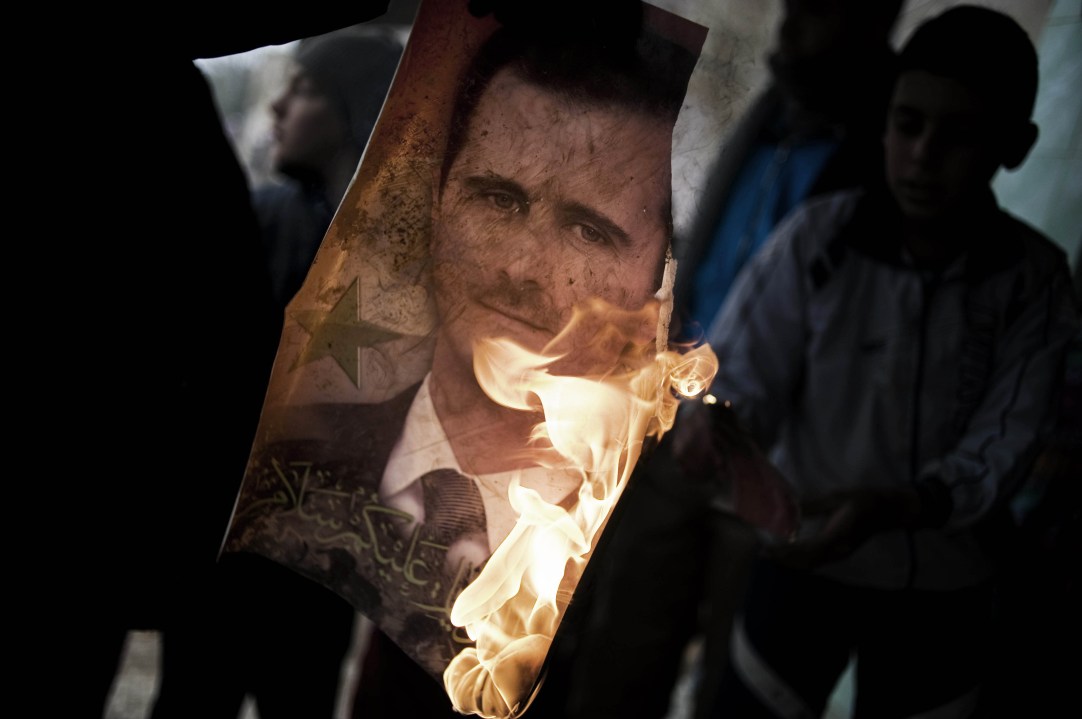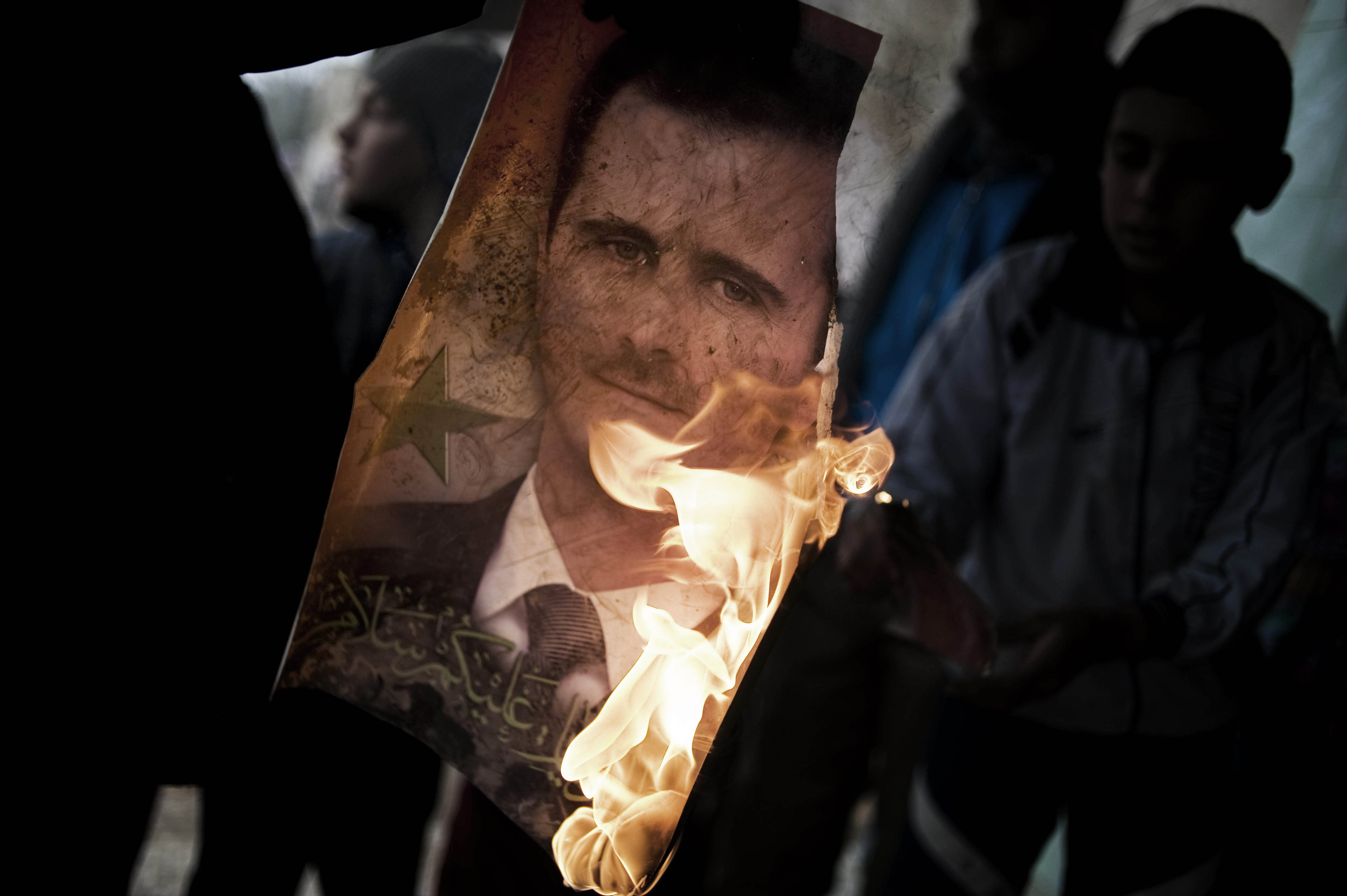It’s unusual for The Guardian and The Spectator to agree on anything, but Seamus Milne and our own John R Bradley are sceptical about these Syrian rebels whom we’re being invited to support. Bradley was alone in predicting the Egyptian revolution, and argues in today’s magazine that the conventional wisdom is once again wrong. Who’s backing the rebels? The Qataris, keen to depose the last secular regime in the Arab world. And the Saudis and Israelis, whose hatred of Iran eclipses all other considerations: this isn’t about the Syrian people, but about depriving the ayatollahs of an ally. Some in the West also take the view that the enemy’s enemy is my friend — so the rebels must be good eggs. We once thought that of the Taleban, when they were ‘freedom fighters’ resisting Soviet occupation.
The West is whistling ‘Wind of Change’ again, just like it did in the Arab Spring, but is finding out that the rebels are radical Islamists who have been using their newfound power to crack down on minorities and insist on veiling up women. In my piece for the Telegraph, I noted how the Syrian Christians fear the Islamists’ triumph, as the Islamic regimes in Egypt, Iraq and Tunisia have led to a persecution of the religious minorities who are relatively unmolested under Assad — who represses all, whether they wear the cross or skullcap.
Yes, Assad is brutal and repressive — and the assault at Homs is shocking precisely because it’s not as exceptional as most reports make out. The death toll for the ‘massacre’ described on Friday has been put at anything between 55 and 400. This should be seen in the context of a dispute which has so far claimed 5,000 lives. Before the Iraq war, Britain rightly listed Saddam Hussein’s atrocities against his own people. But after he went, Britain failed to pacify Basra and looked on as the city fell to Islamist death squads who unleashed a reign of terror. It took the Iraqi army to re-invade the city. We congratulated ourselves at the peaceful decolonisation of India, but hundreds of thousands die in the sectarian violence which ensured. Failure to ask ‘what comes next?’ is a major problem in Western foreign policy. And this is why I’m nervous about the clamour to depose Assad: we’re not really sure that the new regime which the UK is helping usher in would be that much better. It’s easy to stand up and deplore Assad. But can William Hague really stand up and say that the Syrian people would be better off under whatever regime the rebels would bring in? If not, why is he backing the rebels? Don’t get me wrong, I deplore Assad and his brutality. I’m not convinced the rebels would be as bad: I don’t know enough about them. But I’m not persuaded that regime change in Damascus would do any more than swap one kind of tyranny for another.
As Bradley says:
‘There has been much talk of the Syrian army having committed the worst massacre since Assad’s father ordered the slaughter of up to 30,000 members of the Muslim Brotherhood in Hama in 1982. But soon after China and Russia’s veto, the figure for those killed in Homs was reduced from 200 to 55 by one of the opposition groups (although others insisted more were killed). Homs then came under renewed military bombardment, and yes, dozens have been killed, which is sickening news to be sure, but sadly nothing out of what has passed for the ordinary in Syria for the past year. However, this idea of “a massacre” went viral. It was a “crime against humanity” and “its perpetrators must answer for it”, said Alain Juppé, foreign minister of France (and the prime architect of the Libya invasion). The West seems as keen as ever to see the uprisings as a simple story of freedom fighters opposing tyranny, when the situation is clearly much more complex. There seems to be an awful repeat of the Libya debacle beginning to unfold: western correspondents embed themselves with self-declared former al-Qa’eda fighters and bands of tribal fanatics, but fail to report these details so as not to undermine the “Arab Spring”. The result of this in Libya is plain to see. Once the Islamist militias had established their rule in Tripoli, they imposed sharia law on a once secular country and set about torturing their former enemies — or anyone who happened to be black — in a way that would have put even Gaddafi to shame. Now the same voices that helped the Islamists take over Libya — and then feigned surprise when they introduced a new, perhaps even worse type of despotism — are calling for yet another armed revolution in Syria. It doesn’t seem to matter to them that, should their insurrection succeed, the new regime might cause untold suffering for the Syrian people, most of whom (it is not often reported) have not joined the uprising. Why would they? They have plenty of justification for fearing that what will come after Assad could prove far more repressive culturally, and potentially murderous.’








Comments